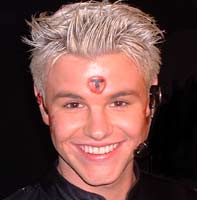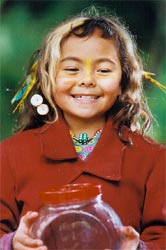Hey, stinky. How about a breath mint?
You may forget about your teeth most of the time, but, for the people around you, they are a constant presence:
Are you chewing with your mouth open?
Talking with your mouth full?
Do your teeth look like you borrowed them from the costuming department for Austin Powers?
Or is your smile the best in town?
No matter what the quality and contents of your mouth, it is a huge part of how you interact with the world around you. A poorly kempt set of fangs can seriously undermine even your best relationships. But a nice smile….well that can win new friends before you’ve even said hello.
Oral hygiene reaches beyond the comforts of your friends and family. Poor care of your mouth and teeth can turn into a very painful situation for you, causing your gums to ache and bleed and your teeth to rot (turning them soft and black; it’s pretty gross) and fall out. Oral problems can cause speech impediments, difficulty breathing, and even poor nutrition (as your chewing becomes effected).
I hear the Egyptians invented braces. (or: a brief history of how my breath came to smell less rank)
Gum disease and tooth decay are not new problems. Rather, they are problems that have plagued people as long as people have plagued the earth. The 25,000 year old skulls of Cro-Magnons show evidence of tooth decay. The earliest known written reference to tooth decay dates back to an ancient Sumarian text that describes tooth-decay-causing Tooth Worms (these are probably like caviar to the Tooth Fairy).
The Chinese began using acupuncture to treat tooth pain around 2700 BC.
 The Ebers papyrus, an ancient Egyptian text on medical practices dating as far back as 3700 BC, contains references to various tooth diseases, as well as prescriptions (such as olive oil, dates and green lead) to alleviate pain. An Egyptian lower jaw dated ~2900-2750 BC contains holes drilled into the bone, presumably to drain an abscessed tooth.
The Ebers papyrus, an ancient Egyptian text on medical practices dating as far back as 3700 BC, contains references to various tooth diseases, as well as prescriptions (such as olive oil, dates and green lead) to alleviate pain. An Egyptian lower jaw dated ~2900-2750 BC contains holes drilled into the bone, presumably to drain an abscessed tooth.
The Greeks invented the concept of extracting diseased teeth, created oral ointments, and used red hot wire to treat some problems. They also used wire to stabilize jaw fractures and bind loose teeth. (Don’t worry, Egypt—it’s well known that some of the best Greek ideas were stolen from Egypt….so Egypt still may hold the ancestry to your shimmering metal mouth.)
Dentistry was practised early on as part of the generalised medical field. By 500 BC, the Egyptians had created a separate field of dentistry (at least according to Greek quasi-historian Herodotus, who also wrote about a North-African race whose faces were on their chest).
By 100 BC, Arabian physicians were designing various procedures to scrape teeth (sounds like nails on a chalkboard!), and began applying mouthwashes and dentifrice powders using a small polishing stick known as a “toothbrush.”
You can thank the Middle Ages for the invention of the dental drill (originally a metal rod that was rotated between the dentist’s palms). The Italian Rennaissance brought about the use of gold and lead fillings. Dentists would make house-calls, and were available only to the extremely wealthy. Self-taught rogues began to open up cheap on-street salons, where they acted as both barbers and oral surgeons (and certain death, according to those familiar with the legend of Sweeney Todd).
Nitrous oxide was introduced for use in oral surgery in the mid-1800s.
In the late 1800s the theory of plaque was established (it would not be confirmed for nearly 100 years).
And that brings us pretty close to the present.
Kiss me! I’m a Dentist!
Your dentist may remind you of a scene on Little Shop of Horrors, but imagine life without him. Truly, despite owning a private arsenal of torture devices, dentists are with the good guys. They’re on your side!
 Unfortunately, even though dentistry is a trade with thousands of years behind it, some developing nations cannot yet offer the luxury of dental health to the masses. Tooth decay is increased with the uses of non-fluoridated water, and an excess of junk food (for example, in many impoverished countries, juice, milk, and even clean water are prohibitively expensive, and soda-pop is the only thing affordable to drink). In such countries, simple home dentistry tools like a toothbrush and toothpaste are simply unavailable, or are available at an impossible expense.
Unfortunately, even though dentistry is a trade with thousands of years behind it, some developing nations cannot yet offer the luxury of dental health to the masses. Tooth decay is increased with the uses of non-fluoridated water, and an excess of junk food (for example, in many impoverished countries, juice, milk, and even clean water are prohibitively expensive, and soda-pop is the only thing affordable to drink). In such countries, simple home dentistry tools like a toothbrush and toothpaste are simply unavailable, or are available at an impossible expense.
Volunteers from more privileged nations have recently taken it upon themselves to teach children how to brush their teeth, but they often do not address basic lifestyle considerations, such as the availability of non-sugary foods, or what to do after the toothbrush and toothpaste are spent.
Such programs offer a temporary, non-sustainable solution, when it would be more beneficial to teach about the causes and effects of tooth decay, and work with the locals to find local tools for dentistry, for example using found objects such as sticks, which will always be available.
Hey, Bray! Your breath stinks!
Unfortunately for the characters in the Tribe, they have been raised to be accustomed to the modern tools of post-industrial dentistry, and these are no longer available. The toothbrushes and toothpaste left by their parents will not always be around. Nor do they have the clean, fluoridated water of their past. And their choices of food are grossly limited by their foraging and by chance.
Like people living in undeveloped nations, the kids in TribeWorld are going to have to seek long-term solutions to oral care, using the resources they have available.
And….from the looks of their smiles, and kisses….perhaps they already have.

